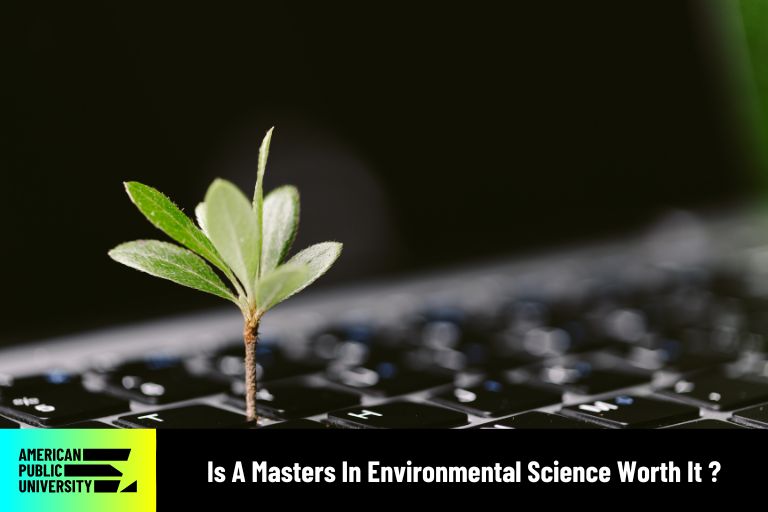02/26/2025

If you're interested in environmental issues and have a desire to learn more about how you could make a real impact on specific areas or pursue more specialized roles in your career, a master's degree in environmental science may be something to consider.
Pursuing a Master's in Environmental Science
Whether you're looking to equip yourself with the expertise to seek specialized roles in the environmental sector, specialize in a new skill set, pivot to a new career or be a lifelong learner, the decision to pursue higher education is a highly personal one. Before enrolling, it's important to make a list of what interests you about the possibility of a master's degree in environmental science. Consider your financial situation and review what your end goals are and which colleges or universities could help you on your path to achieving your goals.
Undergraduate degree programs offer general knowledge about a subject or offer courses that may cover specialized knowledge in addressing environmental issues. A master’s degree offers specialized, focused learning opportunities and may take up to three years to complete.
Pros of an Environmental Science Master’s Degree
Job Opportunities and Growth
According to research at the Bureau of Labor Statistics, jobs for positions like environmental scientists are estimated to grow 7% in the next decade, which is "faster than the average for all occupations."
As the world explores more ways to move from fossil fuels, more green jobs and potential career paths could come into demand.
Specialization
Environmental science master's degree programs may provide more advanced knowledge and marketable skills in fields like environmental policy, sustainability or conservation.
Networking
Environmental science graduate degree programs may offer opportunities to network with similar professionals in the field, and opportunities to conduct and access research projects that may not otherwise be available to environmental scientists.
Impact and Personal Fulfillment
Knowing your "why" behind pursuing an environmental science master's degree may help with this. A master's degree in environmental science may help you to connect with your educational purpose or intent to ultimately work on projects that may impact the environment, like pollution, biodiversity loss, public health, global climate change and more.
Cons of an Environmental Science Master’s Degree
Cost and Debt
Seeking advanced degree opportunities like a master's education may be expensive. If you're already dealing with the high cost of student loans from an undergraduate degree, think about your financial and living expenses before taking on more debt and be realistic about what you can afford.
Time Commitment
The typical timeline for a master's degree may be around 1-3 years of full-time study. This may be a challenge to balance along with a fulltime job, family or other responsibilities. Prioritize your time and consider online education programs that may offer more flexibility with your schedule.
Job Market Competition
Environmental science can be a competitive field. Finding the right job may be challenging, especially in more specialized fields. For example, some environmental science positions may be limited to a single role, like in academic research or in a nonprofit organization.
Location
Location may be crucial for some environmental science jobs. Availability may be subject to location, schedule or even climate demands for research scientists, field specialists or other positions.
Career Opportunities for Environmental Science Graduates
Graduates with a master's degree in environmental science may find opportunities in various industries, depending on their specialization, location and experience.
Specializations Matter
Specific opportunities may depend on the area you specialized in, your interests and your location. There are a wide range of industries and sectors that may have positions, like government agencies, nonprofit organizations, private sectors, public companies or academic institutions.
Positions may be more specialized. For example, environmental consultants may have the chance to consult in with companies and organizations who are seeking a professional to consult on environmental practices, compliance with government regulations and look to to help implement sustainable practices.
Other positions may be an opportunity to conduct your own research or teach at a college or university. Again, specialization may make all the difference for an environmental scientist so you can focus on a desired area like air and water quality, waste management or climate change.
Is a Master’s in Environmental Science Right for You?
To recap, whether you decide to pursue a master's degree in environmental science hinges on many factors.
First, it's important to consider your personal and professional goals and ensure that a master's degree in environmental science would align with them.
Next, research different education programs and their specific course offerings to make sure they meet your needs and focus on the specific areas you're interested in. Weigh the pros and cons of a traditional in-person program versus something that could be more flexible and fit your schedule like an online master's degree option.
If you are considering career changes within the environmental field, reviewing the job market and potential opportunities may be beneficial. Talk to your peers or faculty experts for a different perspective.
Consider how much money you're investing in your education by pursuing a master's degree in environmental science, which may also be an investment in your future career.
Interested in furthering your education in environmental science? Learn more about our master’s in environmental science program today.